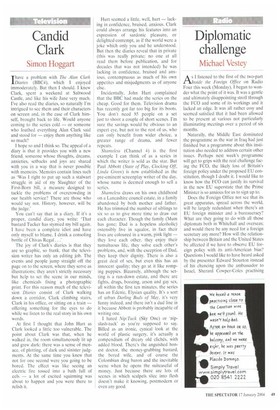Candid Clark
Simon Hoggart
Ihave a problem with The Alan Clark Diaries (BBC4), which I enjoyed immoderately. But then I should. I knew Clark, spent a weekend at Saltwood Castle, and like his wife Jane very much. I've also read the diaries, so naturally I'm intrigued to see them and their characters on screen and, in the case of Clark himself, brought back to life, Would anyone coming to the series cold — or someone who loathed everything Alan Clark said and stood for — enjoy them anything like so much?
I hope so and I think so. The appeal of a diary is that it provides you with a new friend, someone whose thoughts, dreams, anxieties, setbacks and joys are shared with you in a way that is never possible with memoirs. Memoirs contain lines such as 'Was I right to put up such a stalwart struggle in aid of my Slaughter of the First-Born bill, a measure designed to tackle the problems of overcrowding in our health service? There are those who would say not. History, however, will be the judge.'
You can't say that in a diary. If it's a proper, candid diary, you write: 'That bastard Tucker has stymied my bill again. I have been a complete idiot and have only myself to blame. I drink a consoling bottle of Chivas Regal ...'
The joy of Clark's diaries is that they are so graphic, so frank, that the television writer has only an editing job. The events and people jump straight off the page on to the screen, where they serve as illustrations; they aren't strictly necessary but help to set the scene in our minds, like chemicals fixing a photographic print. For this reason much of the television Diaries consist of Clark walking down a corridor, Clark climbing stairs, Clark in his office, or sitting on a train — offering something for the eyes to do while we listen to the real story in his own words, At first I thought that John Hurt as Clark looked a little too vulnerable. The point about Clark was that, when he walked in, the room simultaneously lit up and grew dark: there was a sense of menace, of plotting, of dark and sinister judgments. At the same time you knew that not for one second were you going to be bored. The effect was like seeing an electric fire tossed into a bath full of eels — a lot of excited squirming was about to happen and you were there to relish it. Hurt seemed a little, well, hurt — lacking in confidence, bruised, anxious. Clark could always arrange his features into an expression of sardonic pleasure, or delighted contempt, as if the world were a joke which only you and he understood. But then the diaries reveal that in private (this was really private; no one at all read them before publication, and for decades that was not intended) he was lacking in confidence, bruised and anxious, contemptuous as much of his own appetites and misjudgments as of anyone else.
Incidentally, John Hurt complained that the BBC had made the series on the cheap. Good for them. Television drama has recently got far too big for its boots.
You don't need 85 people on a set just to shoot a couple of short scenes. I'm sure the savings would be obvious to an expert eye, but not to the rest of us, who can only benefit from wider choice, a greater range of drama, and fewer repeats.
Shameless (Channel 4) is the first example I can think of as a series in which the writer is sold as the star. But Paul Abbott (State of Play, Clocking Off Linda Green) is now established as the pre-eminent screenplay writer of the day, whose name is deemed enough to sell a series.
Shameless draws on his own childhood on a Lancashire council estate, in a family abandoned by both mother and father.
He has trimmed the number of siblings to six so as to give more time to draw out each character. Though the family (Mum has gone; Dad is a hopeless alcoholic) ostensibly live in squalor, in fact their lives are coloured in a warm, pink light — they love each other, they enjoy their tumultuous life, they solve each other's problems, and, with the exception of Dad, they keep their dignity. There is also a great deal of sex, but even this has an innocent quality; they go at it like romp ing puppies. Bizarrely, although the setting is a run-down estate, and there are fights, drugs, boozing, arson and gay sex, all within the first ten minutes, the series has an Edenic, Elysian quality. It's a sort of urban Darling Buds of May, it's very funny indeed, and there isn't a dud line in it because Abbott is probably incapable of writing one.
I hated Nip/Tuck (Sky One) or 'nipslash-tuck' as you're supposed to say.
Billed as an ironic, cynical look at the world of plastic surgery, it's actually a compendium of dreary old clichés, with added blood. There's the anguished hon est doctor, the money-grubbing bastard, the bored wife, and of course the Colombian drug baron and the inevitable scene when he opens the suitcaseful of money. Just because there are lots of scenes in which scalpels slice into flesh doesn't make it knowing, postmodern or even any good.


































































 Previous page
Previous page